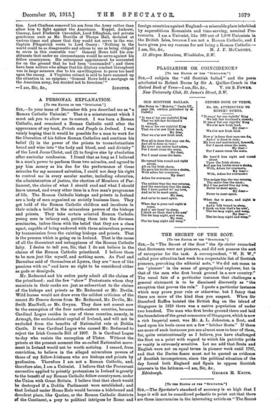PLAGIARISM OR COINCIDENCE ?
[To THE EDITOR OF THE " Sl'ECTATOR."1
subjoin the "old Scottish ballad" and the poem attributed to Robert Burns by Sir A. Quiller-Couch in the OLD SCOTTISH BALLAD.
(See Notes to " Rokeby," Canto HI., page 156, edition published by B. Cadell.)
" It was a' for our rightful King That we left fair Scotland's strand, It was a' for our rightful King That we e'er saw Irish land, My dear, That we e'er saw Irish land.
Now all is done that man can do, And all is done in vain ! My love I my native land adieu, For I must cross the main.
My dear, For I must cross the main.
He turned him round and right about, All on the Irish shore,
He gave his bridle-reins a shake, With adieu for evermore, My dear!
Adieu for evermore.
The soldier free the war returns, And the merchant fine the main, But I have parted wi' my love, And ne'er to meet again,
My dear, And ne'er to meet again.
When day is gone and night is come,
And a' are boun' to sleep,
I think on them that's far awe The lee lang night, and weep, My dear,
The lee lang night and weep."
He turn'd him right and round about Upon the Irish shore; And gas his bridle-reins a ahake„ With, Adieu for evermore, My dear— With, Adieu for evermore!
The sodger free the war returns, The sailor frae the main ; But I has parted frac my love, Never to meet again,
My dear—
Never to meet again.
When day is gene, and night is come,
And a' folk bound to sleep, I think on him that's far awe. The lee-lang uight, and weep,
My dear— The lee-lang night and weep."
OXFORD BOOK OF VERSE.
No. 505, ATTRIBUTED TO ROBERT BURNS.
" It was a' for our rightfu' King We left fair Scotland's strand; It was a' for our rightfu' King We e'er saw Irish land, My dear—
We e'er saw Irish land.
Now a' is done that men can do, And a' is done in vain;
My love and native land, farewell,
For I maun cross the main, My dear—
For I mama cross the main.










































 Previous page
Previous page